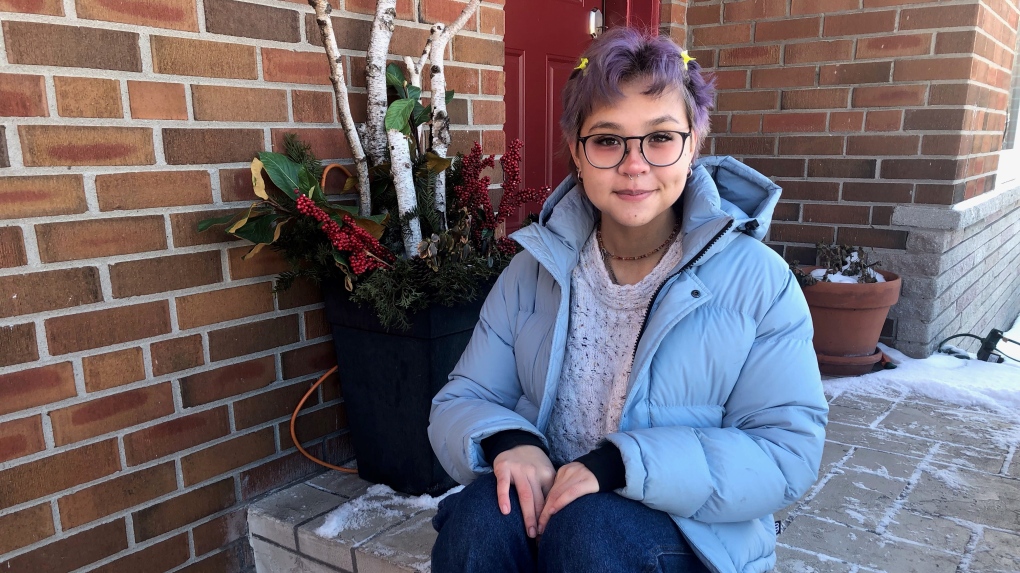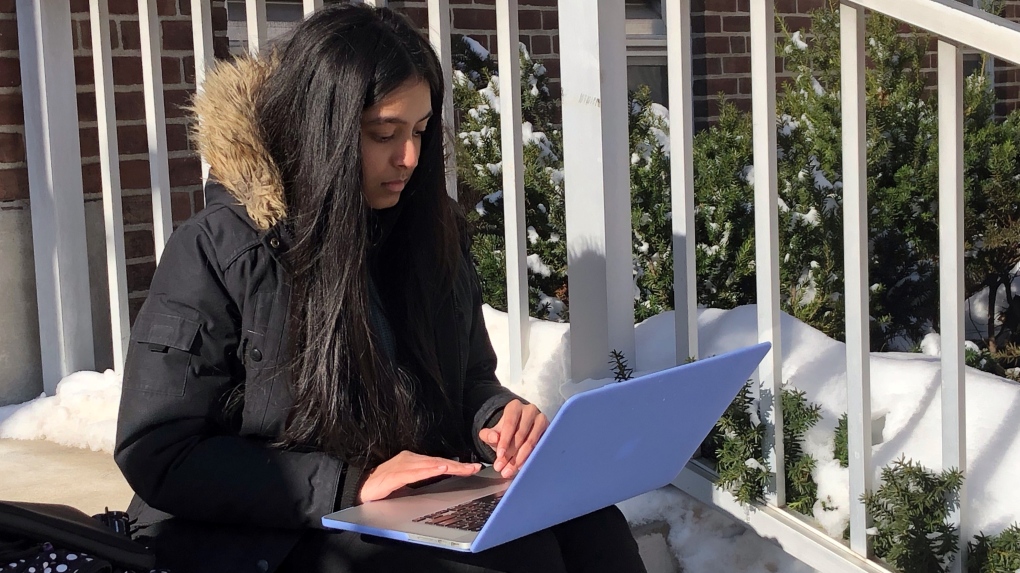'Definitely overwhelming': Pandemic isolation having profound impact on mental health of young people
As the COVID-19 pandemic approaches the two year mark, isolation continues to take a toll on the mental health of young people — although evidence also shows they are also finding ways to cope.
Mari de Jesus is a Grade 12 student at Senator O’Connor College School in North York. The 17-year-old experienced mental health challenges before the pandemic, but in March 2020, they worsened.
De Jesus attributes the change to the isolation and adjusting to the “new normal.”
“It was definitely overwhelming. I know for myself and so many other people, our kind of way of coping with mental issues was distracting yourself and going out and seeing people, but then suddenly I was at home all alone. Alone with all my thoughts,” they said.
De Jesus felt more anxiety and was spiralling, thinking one negative thought, which would turn into many more.
“It was hard to come out of this hole I dug myself into.”
One night de Jesus decided to go to the hospital.
“I didn’t feel safe at home by myself.”
De Jesus is doing better now, managing changes with the pandemic and has a goal to become a social worker.
 Mari de Jesus is seen in this photograph. (Beth Macdonell/CTV News Toronto)
Mari de Jesus is seen in this photograph. (Beth Macdonell/CTV News Toronto)
They said the biggest mental health help during the pandemic was getting online and talking through virtual settings with friends, along with regularly seeing a therapist and texting Kids Help Phone.
De Jesus also uses social media to connect with peers and help others, which helps them cope too.
“100 per cent. That is a big thing for me,” de Jesus said.
“I’m kind of known as the mental health guy, like though my peers. If anyone has a problem they just come to me, even if we are not the closest, just because I’m so open about it. I’m very much trying to stop that stigma around mental health and spark a conversation about it.”
Over time, de Jesus has also been developing coping skills, including learning how to sit with emotions and proceeding mindfully.
“Knowing I don’t feel good right now, but it won’t last forever.”
ISOLATION HAVING PROFOUND IMPACT ON YOUNG PEOPLE
Joanna Henderson is a clinical psychologist, and senior clinical scientist at the Centre for Addiction and Mental Health. She’s also the Executive Director of Youth Wellness Hubs Ontario serving youth from 12 to 25 years of age.
Since the third week of the pandemic, Henderson has helped survey youth in Ontario about their experiences over the past two years, including looking at mental health.
“Isolation has a profound impact on young people,” Henderson said.
Henderson said during adolescences social connections typically mark important shifts, like an expanding social circle, the development of romantic relationships, and the emergence of work social relationships. All of these connections become key to many aspects of functioning.
“With the pandemic this key aspect of adolescent and young adult functioning has been compromised. The public health restrictions, concerns about health, and it created a lot of challenges for many young people.”
Henderson said it means some the developmental paths in terms of social relationships are happening more slowly — and used the example of transitioning from secondary school to post-secondary school or into work to meet new people and build relationships.
Even young people’s ability to get their drivers’ licence is having an impact.
“To be able to have the autonomy to be connecting in the community — all of these things have been delayed for many young people.”
She said the isolation has been “a significant negative” and said youth have experienced increased levels of anxiety and depression, along with concerns about body image and eating behaviours.
Henderson said there are young people who had pre-existing mental health concerns that are now experiencing significant difficultly, and there are those who hadn’t experienced it before, but are now newly experiencing it.
TDSB WELL-BEING PROGRAM TACKLING ISOLATION
A program at the Toronto District School Board (TDSB) is tackling pandemic isolation among students.
Yousra Lakhani, is a peer leader with Students for Well-Being, nicknamed as ‘S4W’ and is a Grade 12 student at Leaside High School.
‘Students are able to come together and discuss initiatives relating to mental health, well-being, coping mechanisms,” Lakhani said.
 Yousra Lakhani is seen in this photograph. (Beth Macdonell/CTV News Toronto)
Yousra Lakhani is seen in this photograph. (Beth Macdonell/CTV News Toronto)
So far she said the events have mostly been virtual — Café Break, for example, is a drop-in about mental health and well-being, created fun games like Pictionary to help spur dialogue.
Lakhani said some of the topics discussed include body image and intersectionality.
“Even on Zoom it’s so nice to see they are so engaged, like talking in the chat and it’s really nice to see the interaction they have.”
Lakhani said one of the benefits of the group is that students are able to come up with the events, which helps keep students engaged.
“I think the pandemic has been really hard for students, especially the uncertainly of the pandemic, not knowing if school is going to open and refreshing Twitter to see what the latest updates are,” she said, adding the disconnect from friends and activities has also been challenging as these interactions are often used as a coping mechanism.
Lakhani said the goal of the meet-ups are to have real talks and so students can relate to one another, because what people are feeling is normal.
Imani Hennie, a social worker and the mental lead with the TSDB, focuses on mentoring and inspiring students in the group about positive mental and well-being, providing mental health literacy so the students can describe their feelings and reach out for help, and help one another.
“We know that students are tired of being home. The pandemic fatigue is there. We know they fear another total lockdown,” said Hennie.
Hennie said some students are also disproportionately impacted based on race - Black, Indigenous and people of colour.
“What we try to really encourage the students to look at what works for them. What is in their control in the moment, in the day. What can they do to make them feel good.”
MENTAL HEALTH DIFFICULTIES TIED TO CHANGES IN PUBLIC HEALTH RESTRICTIONS
Through research, Henderson and others found a majority of youth have experienced mental health difficulties to varying degrees — discovering it improved over the summer and declined as school resumed.
“Interestingly, though not surprising, we do see those difficulties at times for some young people correspond with changes in the public health restrictions,” Henderson said.
“We also interestingly found that there are some young people for whom some aspects of the public health restrictions have actually contributed to improved mental health for them. Some young people have talked about prior to the pandemic their lives were very full, very scheduled, very demanding.”
Henderson said these youth were able to step away from some activities and over time found that they may not return to the same level of busyness, while some found online learning to be a good fit.
Overall, she said, the research has shown there is one story for everyone.
“It’s quite individualized, depending on context and experience.”
ISOLATION AND FINDING WAYS TO BE OKAY
Henderson said the story of youth being isolated during the pandemic has also led to them finding ways to cope with mental health challenges.
“We seen a lot of creativity in terms of how youth are using digital technologies to stay connected,” said Henderson, citing the example of young people virtually watching movies together.
She said some youth are also spending more time outside and in nature.
Henderson said when it comes to “memory-making” experiences, such as graduation when family and friends come together, and the impact of missing these events have, it’s important to be cautious.
“Young people haven’t had those experiences yet. It can be the surrounding family and friends and media that keep sending the messages to young people that this is a terrible thing to have missed. Given they haven’t experienced it, I think we can do more in terms of supporting young people to recognize that there are exciting things ahead.”
She said while acknowledging some missed events are disappointing, it’s important to look forward.
Henderson said what she believes is most interesting is leading to significant changes against multiple domains of functioning of young people is in the school system, which ultimately may lead to more options for young people and may enhance their quality of life down the road.
STAY CONNECTED
Henderson advises youth experiencing mental health difficulties to stay connected to friends and reach out to people who can provide support.
Every day basics and routines are also important.
“Regular sleep routine, eating at regular points throughout the day, getting some exercise, reaching out and connecting with friends and family, these are critical for mental health,” she said.
Henderson said even though the pandemic is two years in, it’s important to keep at it and keep trying and to continue building on the positives.
CTVNews.ca Top Stories

Donald Trump says he urged Wayne Gretzky to run for prime minister in Christmas visit
U.S. president-elect Donald Trump says he told Canadian hockey legend Wayne Gretzky he should run for prime minister during a Christmas visit but adds that the athlete declined interest in politics.
Historical mysteries solved by science in 2024
This year, scientists were able to pull back the curtain on mysteries surrounding figures across history, both known and unknown, to reveal more about their unique stories.
King Charles III focuses Christmas message on healthcare workers in year marked by royal illnesses
King Charles III used his annual Christmas message Wednesday to hail the selflessness of those who have cared for him and the Princess of Wales this year, after both were diagnosed with cancer.
Mother-daughter duo pursuing university dreams at the same time
For one University of Windsor student, what is typically a chance to gain independence from her parents has become a chance to spend more time with her biggest cheerleader — her mom.
Thousands without power on Christmas as winds, rain continue in B.C. coastal areas
Thousands of people in British Columbia are without power on Christmas Day as ongoing rainfall and strong winds collapse power lines, disrupt travel and toss around holiday decorations.
Ho! Ho! HOLY that's cold! Montreal boogie boarder in Santa suit hits St. Lawrence waters
Montreal body surfer Carlos Hebert-Plante boogie boards all year round, and donned a Santa Claus suit to hit the water on Christmas Day in -14 degree Celsius weather.
Canadian activist accuses Hong Kong of meddling, but is proud of reward for arrest
A Vancouver-based activist is accusing Hong Kong authorities of meddling in Canada’s internal affairs after police in the Chinese territory issued a warrant for his arrest.
New York taxi driver hits 6 pedestrians, 3 taken to hospital, police say
A taxicab hit six pedestrians in midtown Manhattan on Wednesday, police said, with three people — including a 9-year-old boy — transported to hospitals for their injuries.
Azerbaijani airliner crashes in Kazakhstan, killing 38 with 29 survivors, officials say
An Azerbaijani airliner with 67 people onboard crashed Wednesday near the Kazakhstani city of Aktau, killing 38 people and leaving 29 survivors, a Kazakh official said.


































